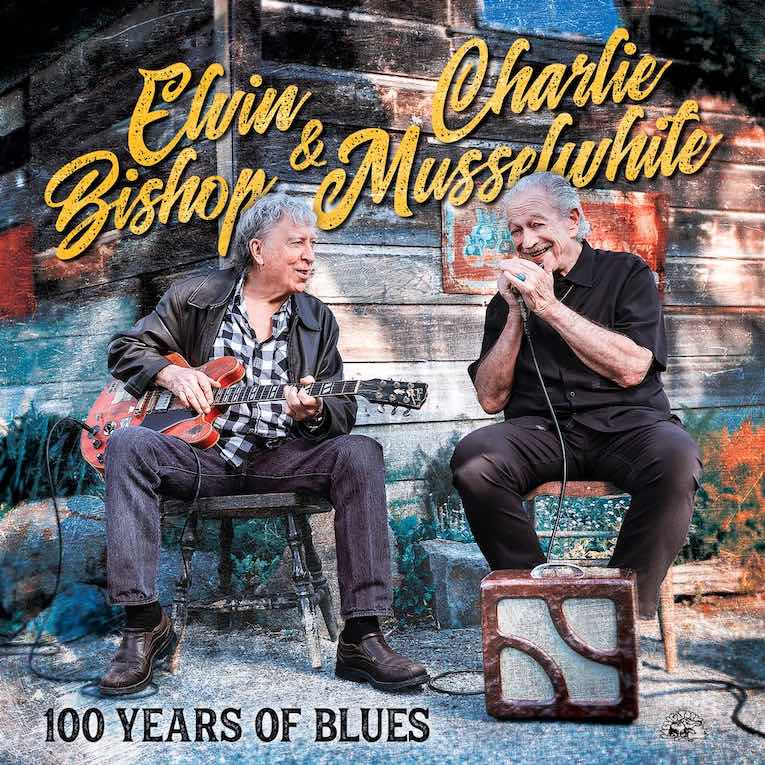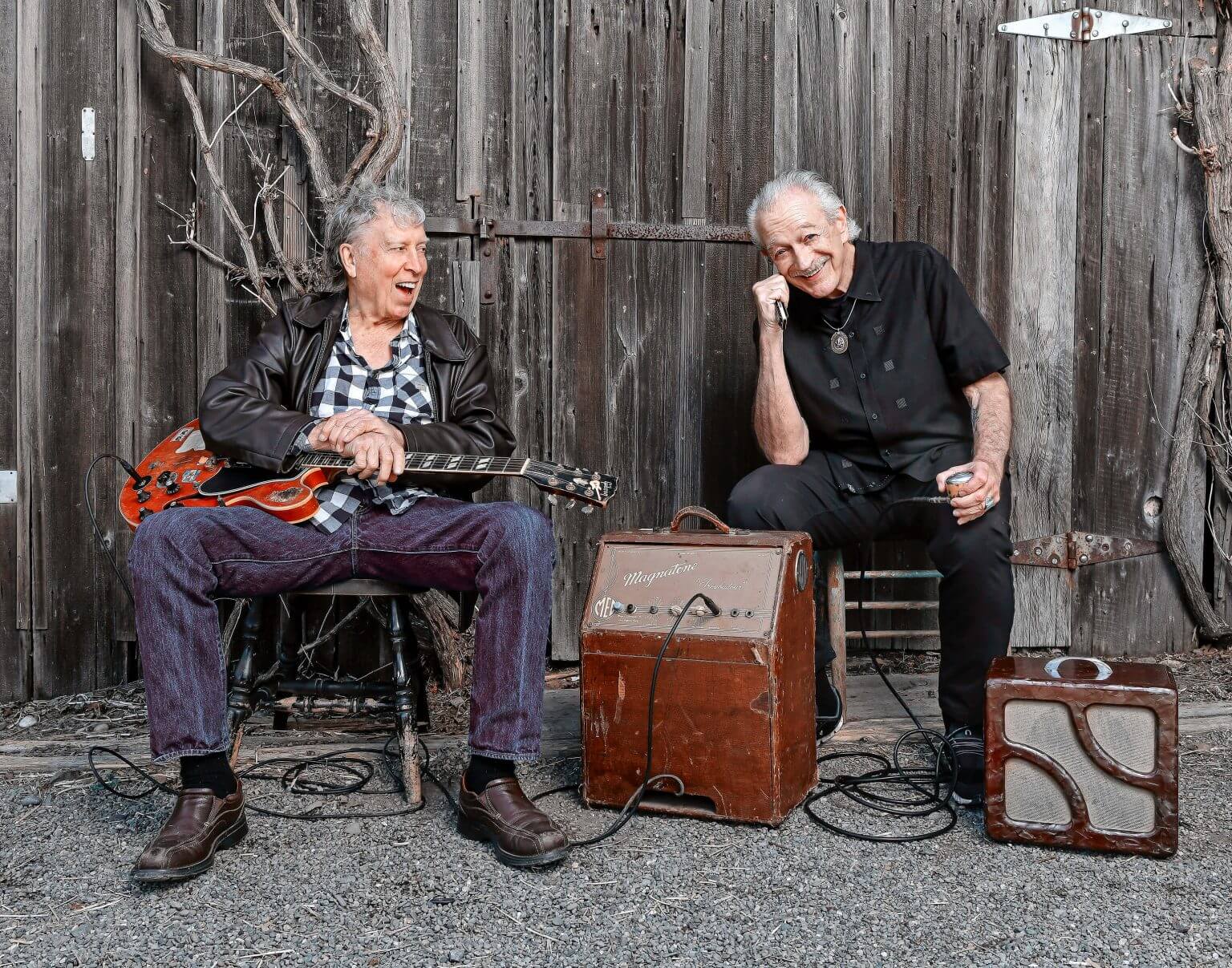When two Blues Hall of Famers with over 100 years of performance experience between them come together, you know you’re in for a helluva ride. That’s exactly what happens on Elvin Bishop & Charlie Musselwhite‘s new Alligator Records release, 100 Years of Blues.

The album kicks off with the apropos “Birds of a Feather,” written by Bishop.
Hey! Here we are, birds of a feather
A whole bunch of blues lovers gathered together
Fixin’ to get loose, have a good time
Like brother Charlie says, ‘I ain’t lyin’
So clap, stomp, holler and yell
We’re all friends here so what the hell
That has to be one of the simplest, straight-to-the-point introductions ever made, and it lays the foundation for everything we hear next.
This entire 12-track release is just two good-old-blues-boys sitting together and jamming. It’s absolutely brilliant. Most of the songs on 100 Years of Blues were written by either Bishop or Musselwhite, and they teamed up to write the title track. Along the way they also pay homage to Roosevelt Sykes with “West Helena Blues,” an appropriate song given the amount of times each artist has played at the King Biscuit Blues Festival. The duo also cover Leroy Carr’s “Midnight Hour Blues,” and Willie Dixon’s “Help Me.”
The album was produced, recorded, mixed, mastered, chopped, scattered, and smothered by Christoffer “Kid” Andersen at his Greaseland Studios in San Jose, and at Bishop’s Hog Heaven Studio in Lagunitas. Kid also plays upright bass on four tracks. The only other artist on the record is none other than Bob Welsh who is part of Bishop’s Big Fun Trio as well as playing and recording with a truckload of blues luminaries. Welsh provides guitar on seven songs and piano on the other five.
The meat and potatoes of 100 Years of Blues, however, is Elvin and Charlie. They both sing, and for their respective ages, both have some powerful pipes. Bishop plays guitar on all the tracks, and of course, Musselwhite blows his legendary harp, but also adds a sweet slide guitar to his self-penned “Good Times.”
On “West Helena Blues,” Charlie blows the hell out of his lickin’ stick, his vocals reminding me of the late, great Johnny Winter if there had been another “YEAH!” or two thrown in. A great slow-burner that just makes you feel some kind of way. Next up, things get political with Elvin taking the lead vocals on “What the Hell?” Bishop’s lyrics have almost always been more tongue-in-cheek of late, but on “What the Hell?” he cuts the fat off the ham with lyrics that point out, in no uncertain terms, what is wrong with our great nation today.
On “Good Times,” Musselwhite sings in two short verses the lamentations of getting older, and maybe not having as much as we once did. What it lacks in lyrical content, the song more than makes up for with his mournful slide. “Old School” has that slightly over-blown tone that makes it sound like these two guys are plugged into portable amps and playing on my back porch. It’s wickedly simple and raw, the way the blues was in its origins.
Most of the tunes on 100 Years of Blues are middle-of-the-road blues tunes. No double shuffles, and few foot-stompers — just great blues music shared by two old friends. “If I Should Have Bad Luck,” is such an example. Of course, there are exceptions. “Midnight Hour Blues” is slower even than Leroy Carr and Scrapper Blackwell’s 1932 original. However, between these two giants it breathes a new, crying life. There’s no humor in Elvin’s vocals on this one, and Charlie’s harmonica is soft and clean. Right after, though, things get barrelhouse with “Blues, Why Do You Worry Me?” Welsh’s piano takes a prime spot behind Charlie’s vocals and Elvin’s guitar, but adds that little something that makes it a tasty track.
“Southside Slide” is a an instrumental we first heard on Bishop’s Big Fun Trio album three years ago, but really gets a work over here with him on slide guitar and Charlie matching him note for note on harp. Musselwhite re-imagines “Blues For Yesterday” from his 2006 Delta Hardware album, again, slowing down the original a bit. But with Charlie being 76 years old, and Elvin being 77, the slowing down part is forgivable, especially when one plays like they do.
Surprisingly, the final track is the title cut. Seems that doesn’t usually happen, especially when it’s the reason the two got together for this album in the first place. In the liner notes, Alligator Records founder Bruce Iglauer explains:
They first joined forces in the studio to cut the original version of the song “100 Years Of Blues” for 2017’s Elvin Bishop’s Big Fun Trio. As Elvin recalls, “Charlie and I ended up jamming a few times after we got to California and actually did a tour of Hawaii in the 80s. We always had a good time playing together, but what really got us wanting to do an album together was how well our song “100 Years Of Blues” turned out—it made me realize how much we have in common. The new album all fell together so quickly and easily. We each brought about half the songs and recorded them all in one or two takes.”
That’s what can happen when two living legends get together for a project. Both came to Chicago in the early 1960s as teenagers from down south—Elvin from Oklahoma and Charlie from Tennessee. It was back when, as Elvin puts it, “We landed in Blues Heaven and were able to get in on the Chicago Blues at its peak, when the classic guys were really hitting heavy—Muddy and Little Walter and Howlin’ Wolf and Magic Sam.” Both immersed themselves in the South Side blues scene, Elvin under the tutelage of guitarist Little Smokey Smothers and Charlie under the mentorship of harmonica giant Big Walter Horton and Delta bluesman Big Joe Williams. Both were accepted by blues fans and, more importantly, by the established musicians because as Charlie explains, they were “from down home.”
100 Years of Blues is exactly that: down home. Isn’t that what we all want the blues to be? No matter where we’re from we want the music to take us home, and this album does it. 100 Years of Blues hits the streets on September 25th, 2020.
Elvin Bishop Facebook
Charlie Musselwhite
Alligator Records
*Feature image Steve Jennings courtesy of Alligator Records

